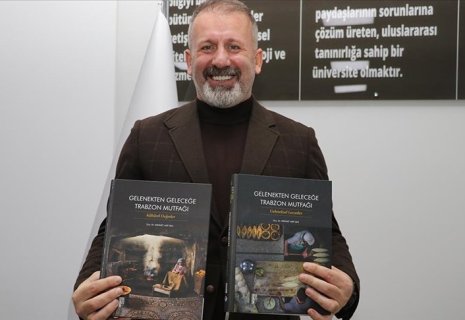
Can Kosovo’s universities reverse Europe’s brain drain?
By Blerim Olluri and Xhavit Rexhaj
Every summer, a new generation of young, educated Kosovars packs their bags—not for vacation, but for good. They head to Germany, Austria, Switzerland, or beyond, chasing opportunities they believe their home country cannot offer. This isn’t a new story for the Western Balkans, but it's becoming an irreversible one.
The migration of skilled youth from countries like Kosovo, Albania, and Bosnia and Herzegovina has reached alarming levels. Entire sectors-especially healthcare, engineering, and information technology-are being hollowed out. Governments watch the best and brightest walk away, while struggling to patch together policy fixes that rarely go beyond slogans or short-term incentives.
Yet amid this growing crisis, there is a glimmer of hope-coming not from government ministries, but from the lecture halls and innovation labs of institutions like AAB College in Pristina.
The Digital Revolution Meets Brain Drain
Higher education in the region is beginning to reimagine its role-not just as a pipeline to domestic jobs, but as a launchpad for global, remote-ready employment. This shift is critical. The global workforce is moving online, and so should the opportunities for young people in the Balkans.
At AAB College, we're not just preparing students to graduate-we're preparing them to compete in the digital global economy. We’ve begun redesigning programs to align with the needs of remote industries: from digital marketing and UX design to freelance IT and online education. We're embedding language skills, soft skills, digital literacy, and global credentials into every curriculum. The goal? To equip young Kosovars with the tools they need to work from Kosovo-not despite it.
This isn't just about enabling emigration in a more comfortable form. It's about brain circulation instead of brain drain. It's about building a workforce that can thrive locally while connecting globally.
A Regional Exodus
The numbers tell a stark story. Albania lost 15% of its population between 2011 and 2021. In Serbia, an estimated 50,000 people emigrate each year. Kosovo, despite its youth-heavy population-over 50% under the age of 30-struggles with more than 30% youth unemployment. The 2024 EU visa liberalization only made migration easier, further draining talent from an already strained labor market.
Every country in the Western Balkans faces its version of this story. And while government programs like tax breaks for returnees or diaspora networking initiatives sound good on paper, they rarely come with the infrastructure needed to truly change the equation. Most young people leave because they see no viable future at home.
But the equation is changing. Remote work-once considered a niche-has gone mainstream. And if the region can harness this shift, it could redefine the story of migration altogether.
The AAB Model: Education Without Borders
AAB College is taking this seriously. We've established international joint master’s programs, collaborated with universities abroad, and created online platforms that allow Kosovars living in the diaspora to continue their studies and earn credentials without navigating the red tape of host countries.
Most importantly, our programs are designed to allow students to work remotely during or after their studies, bridging the gap between graduation and global employment. Whether they choose to stay in Kosovo or live abroad, they can continue contributing to the knowledge economy of their homeland.
And we’re not alone. If more universities across the Balkans adopt similar strategies—blending academic rigor with real-world digital skills-we can build a generation that sees staying not as a sacrifice, but as a strategy.
What Needs to Happen Next
Higher education can’t do this alone. Governments must recognize the strategic role universities play in migration policy. That means integrating academic reform with labor market forecasting. It means funding innovation in online learning and cross-border credentialing. It also means treating remote employment not as a stopgap, but as a legitimate pillar of national economic development.
Most importantly, it requires abandoning the outdated notion that success equals physical relocation. In the 21st century, success can be measured not by where you go, but by how you connect.
The Western Balkans is at a crossroads. We can continue exporting our talent-or we can empower it to thrive at home, plugged into the world, but rooted in its own communities. AAB College has chosen the second path. It’s time for the region to follow.
[Dr. sc. Blerim Olluri] is Rector and Professor at AAB College in Prishtina.
[Dr. sc. Xhavit Rexhaj] is Professor at AAB College in Prishtina
References
World Bank. (2024). Migration and Development Brief 40. Washington, DC: World
Bank Group.
European Commission. (2023). Western Balkans: Enhancing Human Capital and
Reducing Brain Drain. Brussels: EU Publications Office.
UNDP. (2022). Youth and Migration in the Western Balkans. United Nations
Development Programme.
ETF. (2023). Skills for the Future: Western Balkans Regional Overview. European
Training Foundation.
Harvard Business School, Fuller, J., Raman, M., Bailey A., Vaduganathan N., et al
(November 2020). Building the on-demand workforce. Published by Harvard Business
School and BCG.
The Honorable Chancellor Blerim Olluri has extensive experience teaching at universities, particularly in the field of criminal justice. At present, he serves as the Rector of AAB College, one of the biggest universities in Kosovo and beyond the region Olluri is an active member of the American Academy of Forensic Sciences (AAFS) and served on the Quality Council of the Kosovo Agency for Accreditation of Higher Education Institutions.
He is certified as a forensic expert in numerous fields. He has taken part in specialized trainings and scientific conferences both domestically and abroad. A number of his scientific publications have appeared in numerous regional scientific journals, “SCOPUS,” and “Web of Science.”
https://aab-edu.net/en/persons/blerim-olluri-3/
Dr. Xhavit Rexhaj has built an outstanding academic profile, with a long and multidimensional experience in the field of education. He began his academic journey at the University of Pristina, graduating in 1987 as a teacher of English language. He pursued further specialization and deepened his knowledge through multiple academic and professional degrees. Between 1993 and 1995, he was awarded a scholarship to Ruskin College, Oxford, where he completed a Postgraduate Diploma in British Studies, with the final Dissertation focused on “British attitudes towards the Balkan crises from 1945 to 1995”.
His commitment to education is reflected in two Master’s degrees earned at the University of Pristina: one in English Philology (2009) and the other in Education Sciences (2011). These culminated in a PhD in Education from the University of Tirana (2016), with a dissertation titled “The Application of Constructivism in the Teaching and Learning of English in Kosovo Schools.” Additionally, in 2016 under a Fulbright Scholarship, Dr. Rexhaj completed postdoctoral studies at UCLA and Lehman College in the U.S., focusing on educational leadership, management, and learning theories.
Photo: Arbenllapashtica
























